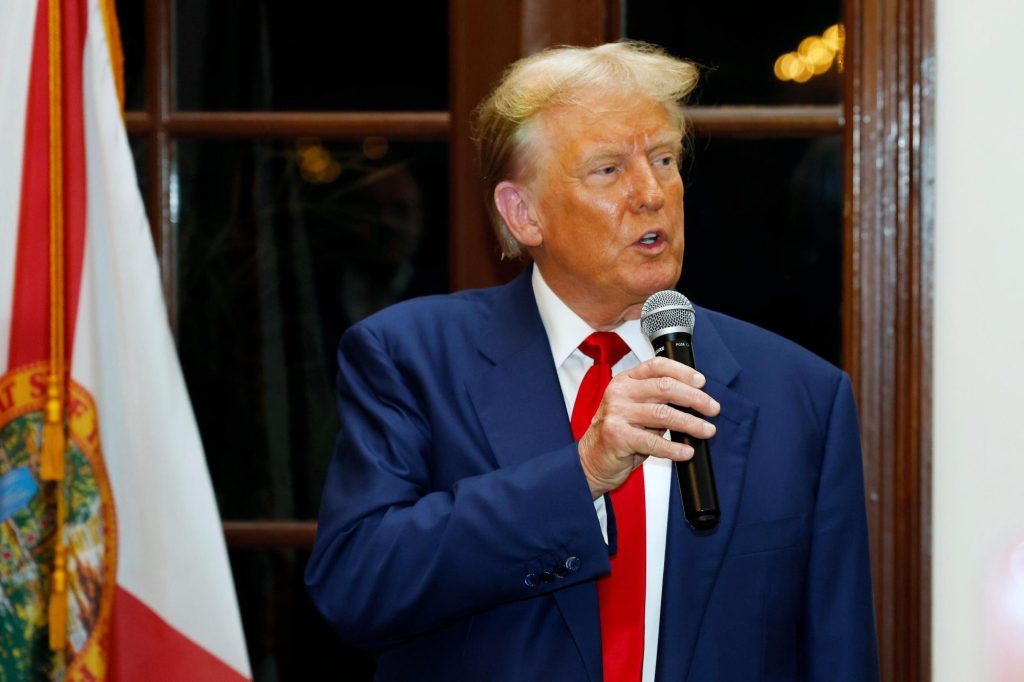By MICHAEL R. SISAK and JENNIFER PELTZ (Associated Press)
NEW YORK (AP) — Donald Trump put up a $175 million bond on Monday to stop the collection of the more than $454 million he owes and to stop the state from seizing his assets while he appeals a civil fraud case in New York, according to a court filing.
A New York appellate court had given the former president 10 days to put up the money after a panel of judges agreed last month to reduce the amount needed to halt enforcement.
The bond Trump is providing is meant to ensure payment if the judgment is upheld. If that happens, Trump will have to pay the state the entire sum, which increases with daily interest.
If Trump wins, he won’t have to pay the state anything and will get back the money he has put up now.
“President Trump has posted bond as promised. He is looking forward to defending his rights on appeal and overturning this unfair verdict,” said one of Trump’s lawyers, Alina Habba.
Before the appeals court stepped in to reduce the required bond, New York Attorney General Letitia James had been prepared to start collecting the judgment, potentially by seizing some of Trump’s prominent properties. James, a Democrat, filed the lawsuit on the state’s behalf. Her office declined to comment Monday.
The court reduced the required bond after Trump’s lawyers argued that it was nearly impossible to get an underwriter to approve a bond for the $454 million plus interest that he owes.
The company that issued the bond is Knight Specialty Insurance, which is part of the Knight Insurance Group. The chairman of the company, billionaire Don Hankey, stated that both cash and bond were used as collateral for Trump’s appellate bond.
“This is our specialty at Knight Insurance, and we’re willing to do this for anyone in need of a bond,” said Hankey, who is best known in the business world for providing high-risk, high-interest loans to car buyers with poor credit histories. Hankey told the AP that he has never met or spoken with Trump.
Trump is trying to reverse a judge’s Feb. 16 ruling that he misrepresented his wealth while building the real estate empire that propelled him to fame and the presidency. The trial focused on how Trump’s assets were valued on financial statements given to banks and insurers to secure loans and deals.
Trump denies any wrongdoing, asserting that the statements actually undervalued his fortune, included disclaimers, and were not taken at face value by the institutions that lent to or insured him.
The state courts’ Appellate Division has indicated that it will hear arguments in September. A specific date has not been determined. If the schedule holds, it will fall in the final weeks of the presidential race.
Under New York law, filing an appeal generally does not delay the enforcement of a judgment. However, there is an automatic pause — called a stay in legal terms — if the person or entity obtains a bond guaranteeing payment of what is owed.
Sometimes, courts make exceptions and reduce the amount of money needed for a stay, as in Trump’s situation.
Trump’s attorneys informed the appeals court that over 30 bonding companies were not willing to accept a combination of cash and real estate as collateral for a $454 million-plus bond. Underwriters insisted on only cash, stocks, or other assets that can be turned into cash quickly, the attorneys stated.
They mentioned that most bonding companies require collateral equal to 120% of the amount owed.
Trump recently stated that he had nearly $500 million in cash, along with billions of dollars in real estate and other assets, but he wanted to keep some cash available for his presidential campaign.
Recent legal debts have significantly reduced Trump’s cash reserves.
In addition to the $175 million he had to put up in the New York case, Trump has provided a bond and cash totaling more than $97 million to cover the money he owes to writer E. Jean Carroll while he challenges verdicts in two federal civil trials. Juries found him guilty of sexually assaulting her in the 1990s and defaming her when she made the accusation public in 2019. He denies all the accusations.
In February, Trump paid the $392,638 in legal fees that a judge ordered him to pay for The New York Times and three reporters after he unsuccessfully sued them over a Pulitzer Prize-winning 2018 story about his family’s wealth and tax practices.
In March, a British court ordered Trump to pay legal fees of 300,000 pounds ($382,000) to a company he unsuccessfully sued over the so-called Steele dossier that contained scandalous allegations about him. Trump stated that those allegations were not true.
Trump could eventually generate cash by selling some of his nearly 60% stake in his newly public social media company, Trump Media & Technology Group — but that would be a longer-term strategy. Trump’s stake could be worth billions of dollars, but a “lock-up” condition prohibits insiders like him from selling their shares for six months.









